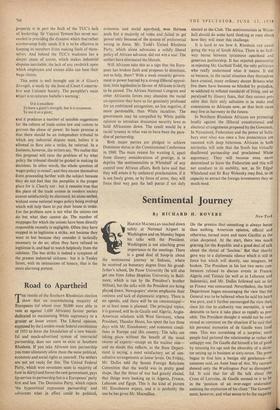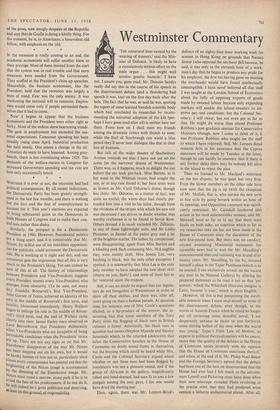Sentimental Journey
By RICHARD
HAROLD MACMILLAN touched down safely at'National Airport in Washington and on Monday began his talks with the President. Washington is not attaching great importance to the meetings. There is a good deal of hoop-la about the sentimental journey to Indiana, where he received an honorary degree from his grand- father's school, De Pauw University (he will also get one from Johns Hopkins University in Balti- more, which is run by the President's brother Milton), but the talks with the President are being playe4 down. Newspapers' stories emphasise their cosiness and lack of diplomatic urgency. There is no agenda, arid there will be no communiqué— or at least none is planned. The principal topics, it is guessed, will be de Gaulle and Algeria; Anglo- American relations with West Germany, whose President, Theodor Heuss, has spent the last three days with Mr. Eisenhower; and economic condi- tions in Europe and this country. The talks are taking place without the benefit of the usual swarm of experts—except on the nuclear side— and no doubt this reflects, as the State Depart- ment is saying, a most satisfactory set of con- sultative arrangements at lower levels. On Friday, Mr. Dulles told the Senate Foreign Relations Committee that -the world was in pretty good shape, that the threat of war had greatly abated, that things were looking up in Algeria, France, Lebanon and Egypt. This is the kind of picture Mr. Eisenhower enjoys, and it is probably the one he has given Mr. Macmillan. ON the premiss that something is always better than nothing, American opinion, official and otherwise, turned more and more Gaullist as the crisis deepened. At the start, there was much grieving for the Republic and a good deal of talk about the threat of 'fascism.' But that shortly gave way to a diplomatic silence which is still in force but which will shortly, one imagines, be broken. The President in his last two news con- ferences refused to discuss events in France, Algeria and Tunisia (as well as in Lebanon and Indonesia), and Mr. Dulles followed suit as far as France was concerned. Nevertheless, the State Department began encouraging the view that the General was to be believed when he said his heart was pure, and it further encouraged the view that, since his rise to authority was inevitable, it was desirable to have it take place as rapidly as pos. sible. The President thought it would not be con- strued as comment on the situation if he said that his personal memories of de Gaulle were fond ones. This was something of a surprise; most people had pictured the relationship as rather an unhappy one. De Gaulle did himself a lot of good by stressing his age and the absurdity of a dicta. for setting up in business at sixty-seven. The press began to find him a benign old gentleman—at someone said, an Aunt Joan of Arc. My canvass showed only the Washington Post as disrespect. ful. It said that for all the talk about the Cross of Lorraine, de Gaulle seemed to it to be in the 'position of an over-eager undertaker assisting the expiration of his client.' The Govern- ment, however, and what seems to be the majority of the press, now smugly despairs of the Republic and says that de Gaulle is doing a kindly thing. For the moment, he is, to Americans, a benevolent old fellow, with emphasis on the 'old.'
IF the recession is really coming to an end, the academic economists will suffer another blow to their prestige. Most of them insisted from the start that the system was in real trouble and that stern measures were needed from the Government. They scoffed at the President's chins-up speeches. Meanwhile, the business economists, like the President, held that the recession was largely a state of mind. Fear was the only enemy. It was weakening the national will to consume. Depres- sion would come only if people persuaded them- selves that it had to come.
Now° it begins to appear that the business economists and the President were either right or lucky. Most of the indices show heartening trends. The gain in ,employment has exceeded the sea- sonal expectations. Consumer spending has been steadily rising since April. Industrial production has held steady. One senses a change in the air. Anxieties do seem to have lessened. Among grey- beards, there is less reminiscing about 1929. The demands of the welfare-statists in Congress for increased Government spending and tax cuts are now only occasionally heard.
WHETHER it is over or not, the recession had had political consequences. By all recent indications, the Democratic Party has been greatly strength- ened in the last few months, and there is nothing but the fact and the fear of unemployment to account for it. This year's elections are expected to bring substantial gains to the Democrats in both Houses of Congress and to make their con- trol sure rather than shaky.
Similarly, the prospect is for a Democratic President in 1960. However, Presidential politics are a thing apart, and it is conceivable that Mr. Nixon, by skilful use of his matchless opportuni- ties for publicity, could surmount the Democratic tide. He is working at it night and day, and one sometimes gets the impression that all this is very much to the President's liking. Yet one cannot be sure of this at all. The history of relationships between Presidents and Vice-Presidents suggests every President resents every Vice-President who emerges from obscurity. (To be sure, not many Ob.) Franklin Roosevelt's first Vice-President, John Garner of Texas, achieved an identity of his Own in the middle of Roosevelt's first term, and hostility blossomed immediately. Henry Wallace began to enlarge his role in the middle of Roose- velt's third term, and the end of Wallace came clearly into view. James Farley once observed to Lord Beaverbrook that Presidents deliberately select Vice-presidents who are incapable of being formidable candidates when the Presidents' terms are up. There are not any signs as yet that Mr. Eisenhower disapproves of the way Mr. Nixon has been stepping out on his own, but it would be hardly human of him not to, particularly since almost every commentator has pointed out that the brightening of the Nixon image is accompanied by the dimming of the Eisenhower image. Mr. Nixon must tread a narrow, stony path if he is to avoid the fate of his predecessors; if he can do it, e will indeed be a great politician and deserving, at least on this ground, of responsibility.



































 Previous page
Previous page